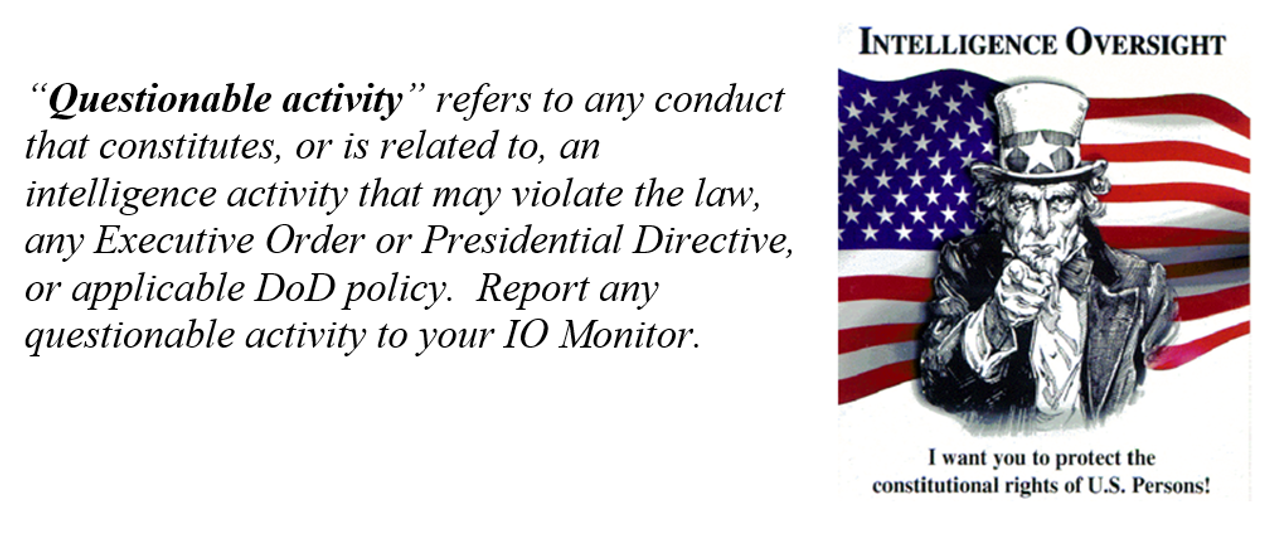PEORIA, Ill. --

This article is intended to provide the 182nd Airlift Wing an awareness of the Department of Defense Intelligence Oversight Program.
Purpose: The Department of Defense Intelligence Oversight program is a by-law program with two main objectives. The program is designed to ensure that the statutory and constitutional rights of U.S. persons are protected while DoD conducts its intelligence and counterintelligence missions.
Background: President Ronald Reagan was concerned about the misuse of government power during the ‘60s and ‘70s and with national security. In 1981, President Reagan signed Executive Order 12333, United States Intelligence Activities, which established the Intelligence Oversight Program. Executive Order 12333 governs intelligence activities throughout the government in order to ensure the interests of national security are protected while maintaining constitutional rights of U.S. persons. DoDM 5240.01 and DoD Regulation 5240.1-R establishes procedures for the conduct of intelligence functions in the Department of Defense while protecting the rights of U.S. persons. AFI 14-404, Oversight of Intelligence Activities, establishes the Air Force’s Intelligence Oversight Program. These are the key intelligence oversight directives for our Intelligence Oversight Program.
Conduct of Intelligence that affect U.S. Persons: The Intelligence Oversight Program not only protects the rights of U.S. citizens but is broader by including U.S. persons. The term "U.S. persons" includes U.S. citizens and permanent resident aliens, unincorporated associations substantially composed of U.S. citizens or permanent resident aliens, and corporations incorporated in the U.S. and not directed and controlled by a foreign government.
All military, civilian and contractor personnel assigned or attached to an intelligence unit are required to have annual Intelligence Oversight training. This requirement also applies to personnel doing intelligence work as additional duty, even if they are not assigned to an intelligence unit or billet. Knowledge of the 15 procedures established by DoDM 5240.01 and DoD 5240.1-R is obtained through annual training.
Key Procedures: Procedure 2 specifies the kind of information about U.S. persons that may be collected and sets forth limitations on the means used to collect such information. Information that identifies a U.S. person may be collected only if it is necessary to an authorized mission and only if it falls within one of 13 categories listed in Procedure 2. Authorized collection shall be accomplished by the least intrusive means.
Procedure 3 governs the information that may be retained by intelligence components. Information can be retained if it was legally obtained as described in Procedure 2. Wing policy is that information can be retained temporarily for up to 90 days for the sole purpose of determining whether that information may be permanently retained under DoDM 5240.01. If a determination is made that information is not properly collectible before the expiration of the 90 day period, it must be purged or transferred immediately per AFI 14-404.
Procedure 15 provides for the reporting of questionable intelligence activities. Unit members are required to report any possible intelligence oversight-associated violations. Use of the chain of command and Intelligence Oversight monitors is encouraged to facilitate such reports where feasible. Each report of a questionable activity shall be investigated to the extent necessary to determine the facts and assess whether the activity is legal and is consistent with applicable policy.
182 OSS INTELLIGENCE OVERSIGHT MONTIORS:
Primary Tech. Sgt. David Foster Phone extension # 5205
Alternate Lt. Col. Timothy “Chet” Hutson Phone extension # 5205